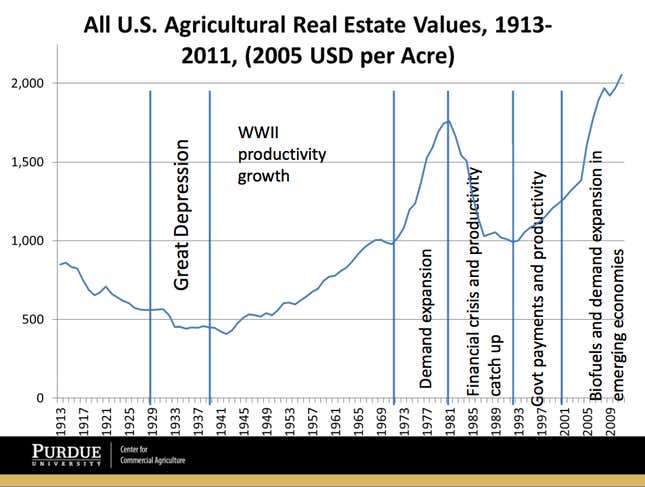We’ll just say it. You should have invested in farmland…in 1913.
But seriously, look at where prices are, courtesy of a chart that Purdue’s Brent Gloy presented to the Chicago Fed (PDF):

The sharp, upward momentum in prices for agricultural land has not been lost on some of the savvier investors out there. Pension funds like it, according to this story:
Another rather illiquid but potential lucrative investments, which are tangible and give good yields, is farmland ”one of the hottest asset classes of institutional investors of late. Indeed, many of the world’s biggest pension funds as well as family offices of wealthy individuals “looking for diversification and steady returns in times of market volatility” have been pouring money into farmlands. These assets, which generate regular income as well as capital appreciation and act as a hedge against inflation, have been popular with investors attracted to their non-correlated returns to those of stocks and bonds.
Hedge funds? Sure, they’re in on it, too.
The interesting thing about investing in farmland is that it is, by its very nature, tough to sell. (Or illiquid, if you want to be a markets geek.) And you know what? That’s exactly what these sophisticated investors want. For one thing, that illiquidity also means that it is somewhat uncorrelated with the price moves of other investments. In recent years, with the rise of index style investing, stock prices have increasingly been moving in lockstep, meaning that markets—to a certain extent—are failing to value companies based on, you know, how much money they make. The rise of high-frequency trading is only making the whole thing worse.
Sure, sophisticated investments like pension and hedge funds have plenty of investments in stocks and bonds and other tradeable assets that get bounced around by the markets every time Harry Reid sneezes after mentioning the fiscal cliff. But they’re not going to be isolated to only investing in such things. That’s for, well … the little people, the ones with 401(k)s.



